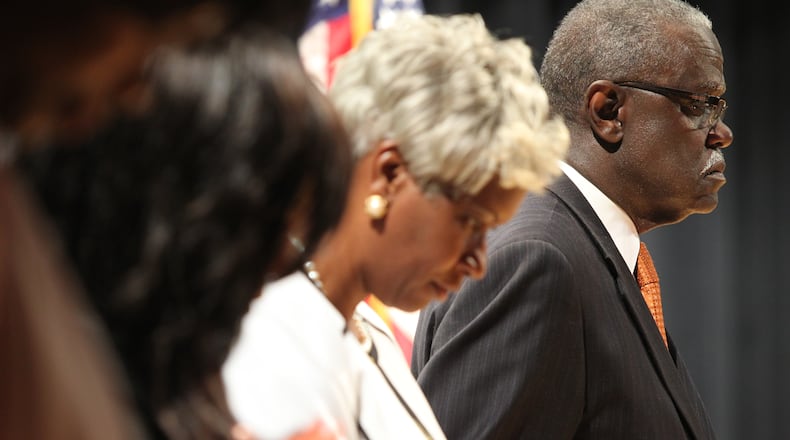In the new city of South Fulton, Mayor Bill Edwards has already used his veto power for the third time.
He rejected council’s proposal to make election day a city holiday. He shot down a plan that would have hired an assistant for each of the city’s seven council members. And after a 6-1 vote in favor of a new city seal, he told council members the version they chose had pieces that could be construed as religious symbols, and sent them back to the drawing board.
“I don’t like to veto,” the mayor said. “If I don’t do it, it makes us look worse than what we are.”
It's a frustrating start for the four-month-old city, and state lawmakers are taking note. They worry that arguments about whether an ankh, the Egyptian symbol for life, is on the city seal will distract from the important work of transferring police, fire and other services from Fulton County. After all, there's a deadline to get it done. The city only has until next November.
"It's a new city. It's going to have these kind of bumps in the road," said Rep. Roger Bruce, D-South Fulton.
Still, he’s proposing changes to the city charter that would clarify that elected council members are supposed to focus on policy, leaving the day-to-day operations of South Fulton to the city manager. He’s also suggesting a change to the veto process, which now lets council members override the veto at the next meeting, if they can get five votes.
That’s not enough time, Bruce said. If the mayor is vetoing so many items, he and members of council need a chance to talk out their differences. He’s suggesting a 30-day window before a veto can be overturned, as well as a public comment period where residents can weigh in on the vetoed item.
Normally, there is no waiting period before a veto and its override, said Amy Henderson, a spokesperson for the Georgia Municipal Association. Then again, Georgia doesn’t have many cities with a so-called strong mayor, who has veto power. It tends to be the case in bigger cities — like Atlanta and Savannah — and newer ones, like Milton and Johns Creek. None of them require public comment, which is reserved in state law for budget matters and zoning hearings.
“It’s a fairly quick process,” she said.
Some council members see Edwards’ use of the veto power as an “intimidation strategy,” said Mark Baker, a member of city council who designed the vetoed seal.
“All of this is being hashed out in public,” Baker said. “It makes it look like we’re in disarray.”
Bruce said he wanted city leaders to "focus on the things that have to be done right now."
“Anything not contributing to that process is a hindrance,” he said.
Still, council members spent more than 30 minutes in a six-hour meeting talking about the seal, explaining the symbolism of each piece. In addition to the ankh, which looks like a cross with a loop on top, city attorney Josh Belinfante questioned whether a bird that bore a close resemblance to the Egyptian god Horus would be considered religious. In the past, he said, cities have lost lawsuits for putting religious symbols in their seals.
Credit: City of South Fulton
Credit: City of South Fulton
Baker countered that the dove and olive branch that are also part of the seal could also have religious connotations.
“It’s objective,” he said. “If we reach far enough, we might find something. The bird is simply a bird. It’s used several times throughout history.”
The vetoed seal also contains the word “Kujichagulia,” a Swahili word that means self-determination. In his veto, Edwards said in addition to concerns about religion, he worried that the symbolism in the seal lacked diversity and could “hamper economic development opportunities in the city as culturally diverse business owners may view it as an affront to non-African American business owners,” preventing chain stores or other businesses from wanting to come to South Fulton.
He also said it could discourage a diverse pool of applicants in the city, whose population is 95 percent black.
“We’re trying to build a wholesome community that’s inviting for everybody,” Edwards said. “I’m not for the seal because it scares the dickens out of me.”
Randy Beck, a constitutional law professor at the University of Georgia, said government isn’t supposed to be endorsing any theology. He doubted most people would see the Egyptian symbols as affirming that religion, but said the city’s presentation was key. In Athens, he said, a statue of the Greek goddess Athena sits outside a government building. The city’s namesake, Athena isn’t considered religious.
Then again, he said, “It’s conceivable that someone who objected to the seal could bring a lawsuit.” Someone just has to be concerned.
Edwards said his main concern is the city’s finances — whether it’s the cost of settling a lawsuit or the proposal to pay assistants who work 29 hours a week $40,000 a year. The mayor makes $23,000, while members of council make $13,000.
He doesn’t like to wield his veto power, Edwards said, but sometimes feels like he has no alternative.
“It’s crazy,” Edwards said. “I’m going to veto anything that harms the image of our city. We got better things to do.”
MYAJC.COM: REAL JOURNALISM. REAL LOCAL IMPACT.
The AJC's Arielle Kass keeps you updated on the latest happenings in Fulton County government and politics. You'll find more on myAJC.com, including these stories:
Never miss a minute of what's happening in Fulton politics. Subscribe to myAJC.com.
In other Fulton news:
About the Author
Keep Reading
The Latest
Featured




